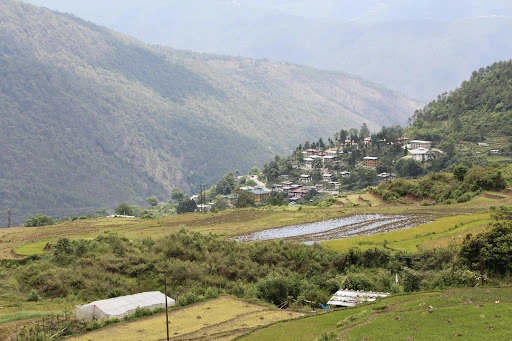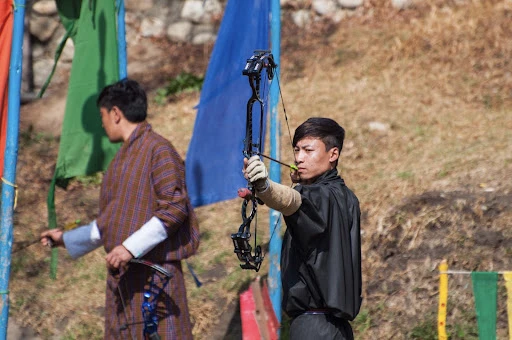In the 1960s, Bhutan allowed visitors only by royal invitation. The last independent outpost of Tibetan culture after the Chinese conquest of Tibet, State Department Political Officer George Griffin stayed in the country’s royal guest house during his visit.
George Griffin, a political officer in Calcutta from 1969–1972, saw firsthand what he called a “sixteenth century Switzerland” during his time in Bhutan.

From hand-sized beetles (thanks to his time with Swiss entomologists) to wars fought with bows and arrows, Griffin experienced a different world during his time in Bhutan. There to garner Bhutanese support at the UN, Griffin ended up advising the country’s tourism minister on potential avenues of future growth, seeing the spectacular beauty—and thus tourism potential—of the country firsthand.
Not all was sunshine and rainbows, however. Griffin had only limited success in distancing Bhutan from Indian influence, and he learned that Bhutan abolished slavery less than a decade prior to his visit. In this moment, Griffin details all that and more, discussing his experiences as an American diplomat in Bhutan.
Throughout his career, Griffin served all over the world—in Italy, Sri Lanka, Pakistan, Nepal, Afghanistan, Nigeria, South Korea, and Kenya.
George Griffin’s interview was conducted by Charles Stuart Kennedy on April 30, 2002.
Read George Griffin’s full oral history HERE.
Read another account of a contemporaneous American visitor, Anthony Quainton, to Bhutan HERE.
Drafted by Zachary Turinsky
ADST relies on the generous support of our members and readers like you. Please support our efforts to continue capturing, preserving, and sharing the experiences of America’s diplomats.
Excerpts:
“It is a friendly, beautiful country, totally unspoiled, rather like 16th century Switzerland.”
Amenities (or lack thereof) of Bhutan:
At that time, there were no tourist facilities in Bhutan—no hotels, no inns, nothing. The only way to go was by royal invitation, which meant staying in a royal guest house. They were quite charming to look at from the outside but they had no heat. It was cold. I think it was in the spring or fall, but we are talking 6-8,000 feet. They did have running water, and servants to build a fire under the boiler. The best way to get warm was to take a shower and leap into bed under a big quilt. It is a friendly, beautiful country, totally unspoiled, rather like 16th century Switzerland.
…Since our trip, they have moved to high-tech like everybody else, but in those days we saw things that would have been at home in medieval Europe. They had short ones and long ones, including a five-foot bow with probably close to a 200-pound pull. They could send an arrow what seemed half a mile with incredible accuracy.
“Bhutan should make sure that the quality of… tourists is high and that they are people who will spend lots of money. He said, “Good point.” So, instead of having a free stay at the royal guest house, we were socked with a steep bill as we were leaving.”

Postage Stamps from Philadelphia:
We called on several ministers, including the Minister of Tourism. He asked us for advice, noting that the only foreign exchange Bhutan was earning was from the sale of postage stamps. The postage stamps were all made in Philadelphia, which cost foreign exchange, so the net gain was not very much. He said the King wanted to bring in tourists.
I jumped in to advise him to study the different experiences of Nepal and Sikkim. I argued that Bhutan should not follow the Nepal model. That would bring in nothing but very low-rent tourists. I said, “You don’t want that.” Secondly, I advised against Sikkim’s example in road building, in which the Indians used too much dynamite, causing massive rock slides and killing hundreds of workers. I urged him to charge their tourists lots of money. That way, they could afford to build hotels. I said Bhutan is a beautiful country, which could attract plenty of tourists, but they should make sure that the quality of those tourists is high and that they are people who will spend lots of money. He said, “Good point.” So, instead of having a free stay at the royal guest house, we were socked with a steep bill as we were leaving. He took my advice to heart, and Bhutan’s tourism has done exactly what I proposed. You can’t spend less than $2,000 in the country, even for two days. And they have preserved the quite spectacular natural beauty of the place.
“We had to dodge beetles as big as your hand half the night.”
The Swiss Entomologists:
The first night we stayed in a government guest house just inside the Bhutanese border in the terai, the lowland part of Bhutan. There were the three of us and four Swiss entomologists. Bhutan was called the Switzerland of the East by some, but this was the first time to anybody’s recollection that serious entomologists had been allowed into the country, and they were happy as pigs in mud. They turned on all the lights in the guest house and insisted that we leave all the windows wide open. There were no screens. They hung netting all over the place, and readied big 100-gallon barrels to be stuffed with insects, formaldehyde, and cotton wool. When the bugs started flying in, there were repeated shouts of “I’ve never seen one of those!” We had to dodge beetles as big as your hand half the night until they filled up one of the barrels. We crossed paths with them throughout our stay in Bhutan. They were everywhere catching bugs.
“I asked him for the date of this battle, assuming it was a couple of hundred years ago. He replied that it was only ten years before.”
Bows, Arrows, and Guns:
Our escort officer was a young foreign service officer. He took us to an isolated village to show us some old stone fortifications, rather like Rumeli Hisar in Istanbul. There was a wall that went down to a river bed. He said this was where the Bhutanese had stopped the last Tibetan invasion. We looked rather surprised, so he went on to describe the invasion, and to stress that the Bhutanese were tougher and stronger than the awful Tibetans, who were egged on by the Chinese, of course. He said the Tibetans had guns, but the Bhutanese only had bows and arrows. Now the Bhutanese at that time were world famous archers – and still are. Anyway, he claimed that their bows and arrows in this fort had stopped the Tibetans, though they did torch the village. He showed us some of the damage. I asked him for the date of this battle, assuming it was a couple of hundred years ago. He replied that it was only ten years before the Chinese incursion in 1962.
TABLE OF CONTENTS HIGHLIGHTS
Education
Georgia Tech
University of South Carolina (B.A.)
Joined the Foreign Service 1959
Naples, Italy—Vice Consul 1959–1962
Calcutta, India—Political Officer 1969–1972
Lagos, Nigeria—Commercial Counselor 1981–1984
Milan, Italy—Consul General 1995–1998
